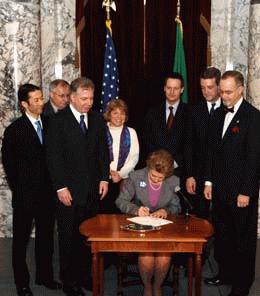On January 31, 2006, Governor Christine Gregoire (b. 1947) signs a law that adds "sexual orientation" to existing prohibitions on discrimination in employment, housing, lending, and insurance. The signing comes four days after the State Senate narrowly approves the measure and nearly three decades after a gay civil rights bill was first introduced in the Legislature. Washington is the 17th state to ban discrimination based on sexual orientation and the seventh to apply the protection to transgender people. Even before the signing ceremony, opponents file ballot measures seeking to overturn the new law.
Paving the Way
Among the nearly 200 people at the bill signing was former senator Pete Francis (b. 1935) of Seattle, who had introduced the first gay rights bill in 1977. That bill failed, as did subsequent attempts. Despite the failures, Democratic Representative (and later Senator) Cal Anderson (1948-1995), who became Washington's first openly gay legislator in 1987, pushed the measure every year until his death in 1995. Anderson paved the way for additional openly gay legislators, and four served in the 2006 Legislature -- Democratic Representatives Ed Murray and Joe McDermott of Seattle, Dave Upthegrove of Des Moines, and Jim Moeller of Vancouver.
Murray was appointed to a State House seat in 1995 following Anderson's death and became a powerful legislative leader, playing a key role on many issues including the $8.5 billion transportation package passed in 2005. Over the past decade, Murray spearheaded efforts to enact civil rights protections for gays and lesbians. Opponents as well as supporters credited Murray as the leading force behind the measure's ultimate success in the Legislature.
In recent years, the House repeatedly passed a bill only to see it die in the Senate, often without a vote. In 2005, with Democrats holding a slim majority, the gay rights bill received a Senate vote but was defeated when two Democrats -- Tim Sheldon of Potlatch and Jim Hargrove of Hoquiam -- joined 23 Republicans to oppose it.
Swing Vote
Sheldon and Hargrove opposed the bill again in 2006, but its passage was all but assured when Republican Senator Bill Finkbeiner of Kirkland, who voted against it in 2005, announced his support. In the Senate debate, Finkbeiner said that the issue boiled down to "whether it's OK to be gay or lesbian in the state" and added "I don't believe it's right for us to say ... it's acceptable to discriminate against people because of that" (Garber and Thomas).
As it had in previous years, the House easily passed the bill. The legislation amended the Washington State Civil Rights Act by adding "sexual orientation" to the Act, which previously prohibited discrimination based on race, creed, color, national origin, sex, or disability. After amending the bill to assert that it did not endorse "any specific belief, practice, behavior, or orientation," the Senate held a roll call vote on January 27, 2006. Supporters including Murray cheered when the bill passed the Senate by a vote of 25 to 23. The House promptly gave its final approval on a 61 to 37 vote, sending the measure to Governor Gregoire, who had promised to sign it.
Even before she did, gay rights opponents moved to overturn the new law. Career initiative-promoter Tim Eyman, who previously worked on I-200, the 1997 initiative that banned government affirmative action programs, as well as a string of controversial anti-tax measures, filed two ballot measures and began seeking signatures to place them on the November ballot. One was a referendum to overturn the gay rights legislation, the other an initiative to prohibit quotas or preferential treatment based on sexual orientation. Eyman argued that voters should decide the issue.
At the signing ceremony on January 31, Gregoire thanked Murray and other current and former legislators who had worked for the bill, including original sponsor Pete Francis. She also paid tribute to Cal Anderson and his work to keep the issue alive. Referring to the proposed ballot measures, Murray said he believed "the voters of this state are going to affirm that they don't believe in discrimination" (La Corte).

